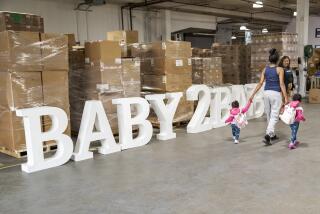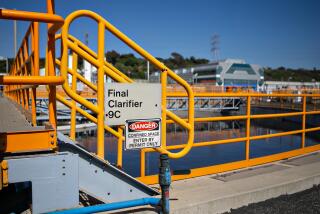Plan for Flushable Diapers Is All Wet, Critics Claim
In a move bound to increase squalling over disposable versus cloth diapers, an Arizona company has announced plans to manufacture a flushable disposable plastic diaper.
RMED International, a Sedona, Ariz., distributor of TenderCare disposable diapers to such retailers as Mrs. Gooch’s health food supermarkets, plans to have its diaper-making machine in place and to produce almost 100,000 a day by May.
The diaper can be flushed into sewage systems, company spokesmen say, because its new bikini shape uses 40% less material than other disposables and it is lined with a plastic mixed with chalk. The chalk, says the company, will break down in the acid normally found in sewage systems.
Environmentalists generally favor a return to reusable cloth diapers because manufacturers of disposable diapers--even those labeled degradable--have been unable to produce convincing research to show that they are harmless to the environment. The disposables now end up in landfills; the new flushables would end up in sewage treatment plants.
“There’s no sense in putting extra strain on already stressed-out sewage systems,” said Lisa Collaton, of the Environmental Action Foundation’s solid waste alternatives project. “It’s clearly an attempt to hold onto their part of the disposable diaper market. . . . These companies are running wild trying to find ways to stay in the market.”
And there are solid indications that the disposable diaper industry is in deep trouble. The National Assn. of Diaper Services reported a whopping 39% increase nationwide from 1988 to 1989 in customers using cloth diapers.
“Flushable diapers only transfer the problem from one source to another,” Arthur Saarinen, president of the Water Pollution Control Federation, a trade group of waste water treatment plant operators and engineers, wrote to a trade publication recently. “The sludge from many treatment plants goes to landfills for disposal (anyway). . . . We will take the contents, but not the packaging.”
Even Ecological Engineering Inc., a small waste water system-consulting firm testing the new diapers, is less than enthusiastic.
“I like people who try to solve problems,” said Susan Peterson, president of Ecological Engineering, “but if I had a septic system, I wouldn’t use them.”
Neither would Peterson welcome flushable diapers if she ran a municipal sewer system.
“If I could devise a flushable diaper in which all components broke down to carbon dioxide and water, that would be great,” she said. “They are part way there.”
More to Read
Inside the business of entertainment
The Wide Shot brings you news, analysis and insights on everything from streaming wars to production — and what it all means for the future.
You may occasionally receive promotional content from the Los Angeles Times.










